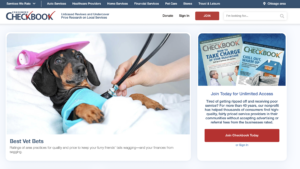It was a Friday night in the fall of 1977. I was a junior in the journalism program at the University of Illinois at Urbana-Champaign. Earlier, I’d gotten an essay exam back during one of my hardest—and favorite classes. I aced it. So, that afternoon, off I went to happy hour at a campustown joint called the Round Robin.
I got home around 7:30—home being a classic old rundown house that I shared with seven housemates. Nobody was home when the phone rang. When I picked it up, I heard the voice of Robert Krughoff for the first time. I can say, without exaggeration, that call changed my life for the good, and for ever.
Weeks before the phone rang that night I’d applied for an internship in Washington, D.C. through an agency that shopped potential interns around the Capital—everywhere from congressional offices to federal agencies to lobbyists—and to various nonprofits.
Robert had called to interview me. Now, the first thing I should’ve thought about was this: It was a Friday night at 7:30 CT, 8:30 ET—and Robert was still at the office. But I was so excited that someone was interested that all I could do is answer his questions as best I could. It was like a 45 minute call.
Somehow, I must have done OK. I was offered the spot and by January of 1978 I was living in a shared apartment on Rhode Island Avenue and 14th NW.
A year or so earlier, Robert and a partner had founded Washington Consumers’ Checkbook. At some point, after a bad experience with a car repair shop, Robert concluded that there should be something like Consumer Reports—but instead of products, it would rate services.
Today Checkbook operations serve seven metropolitan areas with ratings and advice on choosing services like roofers, plumbers, repair shops of all ilks, and the like. It also evaluates health care providers—surgeons, hospitals, dentists, and veterinarians.
That may sound quaint today when we have customer ratings everywhere online. But it was novel back then. And Checkbook’s work still stands superior, in my view, to any popular online ratings sites. That’s because it surveys only its and Consumer Reports subscribers—there can be no ringers or ballot stuffers. It uses actual survey research science in its methodologies. In addition, it does exhaustive price comparisons, and researches complaints (or lack thereof) against firms it rates.
I’m still a subscriber, and still use it regularly.
Robert was an exacting editor and researcher. As my friend Kevin (current executive editor) once said: “Do not ever answer a Robert question unless you are absolutely sure that you know what you’re talking about.” Otherwise, as I learned way back when, you would undergo an exhaustive grilling that would expose you for not knowing your stuff. I can still hear Robert’s deep voice, and his distinctive stammer, as he picked my work apart. It wasn’t cruel, but it was tough.
Robert graduated from the University of Chicago Law School—where he discovered he really didn’t want to practice law. After working at the Department of Health, Education, and Welfare (HEW—later split into Health and Human Services and the Department of Education), he founded Checkbook in 1976.
Robert was precise by nature and by necessity: when you publish information that makes a business look bad, that information better be perfectly accurate.
I interned through June of my junior year. A year later, after my senior year, they offered me a full time job—in the 1979 economy, jobs were hard to come by so I was grateful.
I spent three years driving around the D.C. metro area, visiting supermarkets and hardware stores and other retailers, carrying a clipboard doing market basket price surveys. More than once I was shooed out by managers. I made countless calls posing as a consumer getting price quotes for specific repair jobs. I visited local consumer offices around the region and camped out for days at a time to go through physical files of complaints that had been lodged. I wrote articles—on a typewriter. I stayed late to call subscribers for donations in the evening hours. I even knocked on doors to solicit donations a couple times.
To borrow from an old Peace Corps slogan, it was the toughest job I’ll ever love. And the experience has served me throughout my career stops.
I share all this because I just learned that Robert Krughoff just retired. He left with his organization in great shape. The magazine is just part of the operation now. There is a health care research unit whose clients include federal and state governments, as well as large insurance companies. Way back in my day, Checkbook sued to make public data about health outcomes—data that helps consumers make better choices and that previously had been closely guarded by the industry. (I actually used that data when my dad was looking at open heart surgery.)
You can learn more about my old boss by reading this press release, and/or his open letter. All I can tell you is he had enormous positive impact.
Including on me. Thanks Robert.
PS: Checkbook serves these metro areas:
Chicago
San Francisco Bay area
Delaware Valley
Minneapolis-St. Paul
Boston
Seattle/Puget Sound
Washington, D.C.
If you live in any, check Checkbook out.

Thanks Mike. Sometimes we are lucky enough to run into somebody who turns out to be a great role model. And whether we know that then or realize it later, we can look back with appreciation. And you were one of those people.
[…] written about Robert Krughoff here at the blog before, a brilliant, dogged, demanding, tough, and compassionate man. Much of what I’ve managed to do […]
Leave a Response